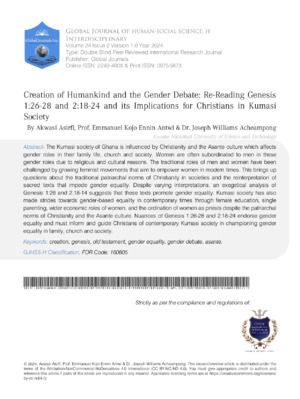Creation of Humankind and the Gender Debate: Re-reading Genesis 1:26-28 and 2:18-24 and its Implications for Christians in Kumasi society
Keywords:
creation, genesis, old testament, gender equality, gender debate, asante
Abstract
The Kumasi society of Ghana is influenced by Christianity and the Asante culture which affects gender roles in their family life church and society Women are often subordinated to men in these gender roles due to religious and cultural reasons The traditional roles of men and women have been challenged by growing feminist movements that aim to empower women in modern times This brings up questions about the traditional patriarchal norms of Christianity in societies and the reinterpretation of sacred texts that impede gender equality Despite varying interpretations an exegetical analysis of Genesis 1 26 and 2 18-14 suggests that these texts promote gender equality Kumasi society has also made strides towards gender-based equality in contemporary times through female education single parenting wider economic roles of women and the ordination of women as priests despite the patriarchal norms of Christianity and the Asante culture Nuances of Genesis 1 26-28 and 2 18-24 endorse gender equality and must inform and guide Christians of contemporary Kumasi society in championing gender equality in family church and society
Downloads
How to Cite
References

Published
2024-05-02
Issue
Section
License
Copyright (c) 2024 Authors and Global Journals Private Limited

This work is licensed under a Creative Commons Attribution 4.0 International License.